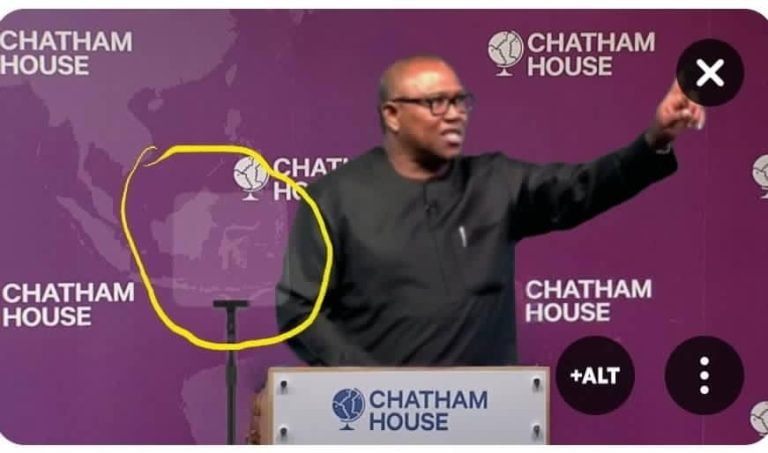Presidential candidate of the Labour Party, Peter Obi, has faced criticism over his display at Chatham House, a policy institute in the United Kingdom where on Monday, he discussed aspects of his widely-faulted manifesto.
Nigerians have accused the former Anambra governor of evading challenges to his little-known plans to grow the country’s economy amid ongoing global headwinds and manage its security complications, despite a heavy reliance on prepared notes projected via a teleprompter and other physical guides handed to him on the rostrum.
Obi, who is running as an unlikely third-party candidate in an election he appears sorely unprepared for, had previously mocked the relevance of a documented manifesto after spending months on the campaign trail without one.
His 62-page ‘Pact With Nigerians’ manifesto came after a first botched attempt in which the candidate denied an initial release despite the same coming from his party.
The embarrassing second attempt nevertheless, Obi’s final document failed to inspire. It was widely adjudged to be vague, full of recycled ideas, and lacking the policy plans and ideas to match the candidate’s central promise to ‘reform’ and ‘change the nature’ of governance.
Obi also faced allegations of copying the ideas of the frontrunner, Bola Tinubu of the APC, whose manifesto release was tidier and came early on in the life of the campaign – a feat hailed by election monitors as a mark of his readiness.
The foregoing may have contributed to Obi’s struggle to field probing questions on his grand promises, including the unclear pledge to move Nigeria ‘from consumption to production’ despite his prominent involvement in the importation of finished goods to the country.
His presentation was littered with categorical declarations such as ‘I will end corruption’, ‘I will bring back Nigerians in the diaspora’ – but with no clarity on the policies and governance tools he intends to deploy in achieving these goals.
Nigerians took notice of the inadequacy and criticized the candidate for merely regurgitating age-long challenges without providing insight into his supposed novel ideas to tackle them.
They also faulted his reluctance to cite his two-term spell as the governor of Anambra state during which he was accused of commissioning subpar projects and failing to invest in growth drivers, including education and healthcare – with his only achievement being ‘keeping funds in the bank’ even in the face of soaring poverty.

